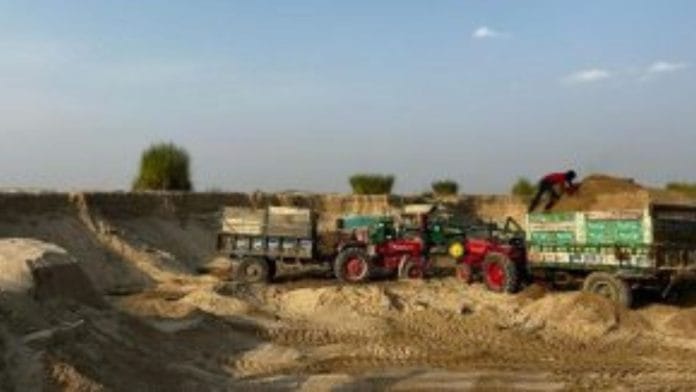New Delhi: There have been 27,693 reported cases of illegal mining, transportation, and stocking in the Aravallis in Rajasthan since 2020; however just 3,199 FIRs—11 percent of the total cases—have been lodged. This is the data the Union Ministry of Environment, Forests and Climate Change (MoEFCC) provided in response to a question in the Lok Sabha on Monday.
The Aravallis are a mountain range that stretches through Delhi, Haryana, Rajasthan and parts of Gujarat. In this ecologically sensitive zone, any kind of quarrying or mining activity is prohibited without requisite permissions from state authorities.
In Rajasthan, there are 20 districts in the Aravalli belt, including Ajmer, Jaipur and Alwar. The MoEFCC provided information about the total number of mining related activities such as total illegal mining cases, total FIRs, vehicle seizures and penalty recovered in rupees in all these districts.
Bhilwara, a district in southern Rajasthan had the highest number of illegal cases reported, with 4,838 cases from 2020 to 2025. It was followed closely by Jaipur, the capital of the state, where 4,261 cases of illegal mining-related crimes were recorded. Not all the cases are specifically of illegal mining, many relate to illegal transportation and illegal stocking of materials too. The cases of illegal mining alone in Bhilwara were 514, while in Jaipur, the figure was 184.
However, the number of FIRs registered differed significantly—in Bhilwara there were 1,102 FIRs lodged over five years but in Jaipur the number was only 68.
In certain years like 2023-24, when Jaipur recorded a total of 747 cases of illegal mining-related activities and 74 cases of illegal mining alone, there were still only 23 FIRs lodged.
The top five districts in terms of illegal mining-related activities are Bhilwara, Jaipur, Tonk, Pali and Rajsamand.
Also read: Illegal Aravalli road: SC panel rebukes Haryana chief secy for pinning blame on forest officials
Measures to stop illegal mining
According to the response by the MOEFCC, there are various measures in place in Rajasthan to protect against illegal mining, including fines and seizure of vehicles when necessary.
The State Directorate of Mines and Geology provides for imprisonment of up to 5 years and fines of Rs 5 lakh per hectare. There are also measures such as deploying Border Home Guards in mining offices, GPS tags on mineral vehicles, and geofencing of mining lease areas to prevent illegal mining.
However, the data provided by the Ministry shows the inconsistency in filing FIRs when mining cases are discovered in the Aravallis. For example in Sikar, when 207 mining-related cases and 5 illegal mining cases were reported in 2020-21, there were 0 FIRs lodged.
Also in Tonk, there were a total of 510 FIRs filed across 5 years from 2020 to 2025, but 460 of these were filed in a single year—2021-22. There were 716 illegal mining-related cases that year in the district. The next year in 2022-23, there were 734 cases. But only 1 FIR was filed the entire year.
Talking about the government’s attempt to preserve the ecology of the Aravallis, the MOEFCC referred to the ‘Aravalli Green Wall Project’, which is an initiative to plant trees in 29 districts to restore degraded forest land.
(Edited by Viny Mishra)
Also read: Modi to kickstart ‘Aravalli Green Wall’ campaign to reforest world’s oldest mountain range






